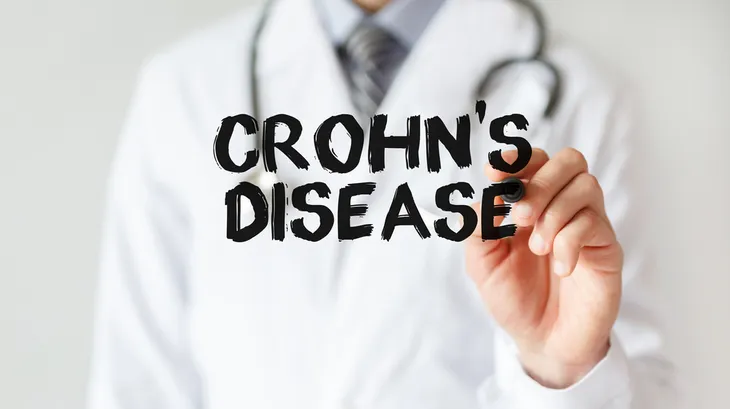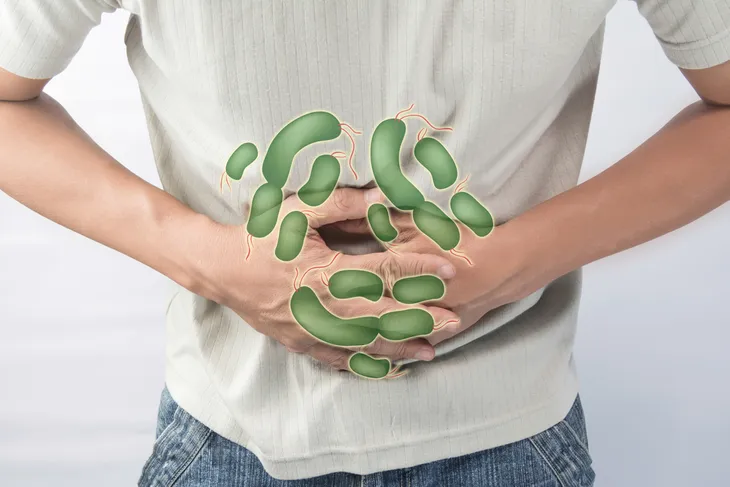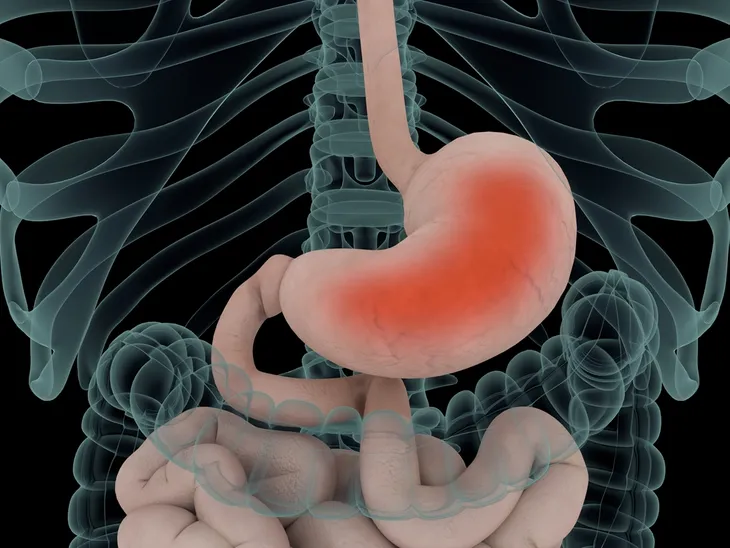- Stomach pain happens to nearly everyone, but it’s important to know the root cause of the pain to remedy it.
- A few common causes of stomach pain that are temporary include food poisoning, stomach flu, gas, and more.
- Some other common causes of stomach pain that could signal a long-term or chronic condition include lactose intolerance, Crohn’s disease, and food allergies.
Just about everybody has stomach pain at some time in their lives. The discomfort could be triggered by indulging in a decadent meal or from eating food that’s a little past its expiration date (OK, maybe a lot past its expiration date).
However, severe abdominal pain is another story, and in most cases, it’s not indicative of a serious health issue. But, in some cases, it can signal a serious illness. That’s why it’s important to be able to differentiate the symptoms of stomach pain. Twelve potential causes of severe stomach pain are…
1. Food Poisoning
Food poisoning can cause serious stomach discomfort due to a bacterial or parasitic infection. Food poisoning can be caused by over 250 different food and waterborne illnesses, ranging from Salmonella to E. coli and from botulism to cholera, resulting in painful abdominal cramping, nausea, vomiting, fever, gas, diarrhea, fatigue, and dehydration.
The Centers for Disease Control and Prevention (CDC) estimates that 48-million Americans suffer with food poisoning annually. Another CDC statistic reveals that 128,000 U.S. citizens are hospitalized yearly with food poisoning, and 3,000 of them pass away due to a foodborne illness yearly.
2. Lactose Intolerance
Lactose intolerance is caused by a lack of the enzyme lactase, which makes it impossible to digest lactose (the sugars in dairy products). According to Healthline, typical symptoms, including gas, abdominal pain, cramps, nausea, bloating, diarrhea, and even vomiting will occur within 30-minutes of consuming dairy products.
Lactose intolerance typically isn’t a serious condition, but it can cause severe stomach discomfort. So, it’s best to avoid trigger foods or have medication on hand to prevent the pain. Because those with lactose intolerance cannot comfortably eat foods and beverages with lactose, one can still take lactase digestive enzymes to help aid the digestion of lactose in the intestines.
3. Gastroesophageal Reflux Disease
Gastroesophageal reflux disease (GERD), also known as acid reflux, typically results after eating a rich, fatty, or particularly filling meal. According to the Mayo Clinic, the end result is painful indigestion that manifests as gas, bloating, abdominal pain, belching, nausea, vomiting, an acidic taste in the mouth, and a burning in the stomach or the upper part of the abdomen.
A balanced diet low in fats and regular physical activity will typically help alleviate GERD. For long-term relief, it’s recommended to consider making lifestyle changes to accommodate the condition and consider consulting a doctor for the best treatment plan to remedy your symptoms.
4. Constipation
It happens to us all, even though it’s mortifying to talk about (even to a doctor), but constipation results in strained or lack of normal bowel movements and is often spurred by stress, diet, or an underlying health problem. The outcome is obviously quite uncomfortable and can last days, causing stomach pressure and pain, a distended abdomen, rectal tearing, and even nausea and vomiting.
According to statistics from WebMD, chronic constipation affects approximately 15- to 20-percent of the population in the U.S. Although not all cases of constipation are serious (constipation can be caused by dehydration, lack of exercise, or inadequate fiber intake), serious causes of constipation include stress, hemorrhoids, laxative abuse, eating disorders, irritable bowel syndrome, Parkinson’s disease, hypothyroidism, depression, and colon cancer.
5. Stomach Flu
Gastroenteritis, known more commonly as the stomach flu, causes the lining of the stomach and intestines to become irritated and inflamed due to a nasty virus or bacterial infection. We’re more than familiar with these symptoms, which consist of nausea and vomiting, abdominal cramps, explosive diarrhea, fever, inability to keep food or fluids down, dehydration, and fatigue.
According to the Mayo Clinic, this extremely contagious disease, especially the viral variants, is transmitted from person to person via contaminated food or water or via contact with contaminated surfaces. Infection with a virus results in the inflammation of the stomach and/or intestines and is most dangerous for older adults, young children, and those with compromised immunity.
6. Menstruation
Abdominal pain from menstrual cramps can occur in women who are menstruating, due to hormonal shifts that cause muscle contractions in the uterus. For some unfortunate females, the cramps can be so severe that they are unable to get out of bed for days. According to the Mayo Clinic, severe menstrual cramps may indicate an underlying health issue such as uterine fibroids or endometriosis.
Doctors refer to the pain and cramps that result prior to and during menstruation as dysmenorrhea. There are two different kinds of dysmenorrhea: primary dysmenorrhea refers to pain in those with normal pelvic anatomy and ovarian function, while secondary dysmenorrhea describes pain due to pelvic dysfunction and typically strikes in the early 20s to mid-40s.
7. Food Allergies
A food allergy results when the digestive system negatively responds to a certain food because of the lack of a digestive enzyme or sensitivity. According to the Cleveland Clinic, the most common food allergies are shellfish, nuts, fish, eggs, peanuts, and milk.
Typically, a period of elimination is required to pinpoint the troublesome food. The individual may suffer from a combination of stomach pain, nausea and vomiting, hives or another type of skin rash, diarrhea, chest pain, gas, bloating, abdominal distention, shortness of breath, and anaphylaxis (an uncontrolled allergic reaction that can be life-threatening) whenever the culprit food is consumed.
8. Acid Indigestion
It’s normal and healthy for us to produce and pass gas as our digestive systems break down the meals we consume. However, difficult-to-digest foods (e.g., beans, dairy, raw vegetables, fruits, and whole grains) can cause excess gas, resulting in painful bloating, chest or esophageal pain, belching, cramps, and flatulence (excessive gas).
Acid indigestion, also known as heartburn, can occur in individuals of all ages and both sexes. According to WebMD, indigestion is often due to a large or rich meal; however, you can also experience indigestion due to excess alcohol consumption, medications, or stress. Furthermore, chronic cases can be caused by irritable bowel syndrome, thyroid issues, GERD, ulcers, stomach infections, pancreatitis, gastroparesis (in diabetics), and stomach cancer.
 Shutterstock/Tero Vesalainen
Shutterstock/Tero Vesalainen9. Peptic Ulcer
Peptic ulcers are painful sores that form in the lining of the stomach or duodenum (the first portion of the small intestine) when the digestive fluids in the stomach become too acidic and a bacterial infection (Helicobacter pylori) causes damage to the tissues.
According to the Mayo Clinic, the most common symptom of a peptic ulcer is intense stomach pain. Oftentimes, ulcers result from long-term stress, but they can also develop from the long-term use of nonsteroidal anti-inflammatory drugs (NSAIDs).
10. Irritable Bowel Syndrome
Irritable bowel syndrome, also known as IBS, is a condition that affects the digestive system. According to the Mayo Clinic, abdominal pain is a primary symptom of IBS, but it can also cause symptoms such as bloating, diarrhea and constipation.
If you struggle with IBS, you may find that certain foods trigger your symptoms such as caffeine or dairy. While a cure of IBS is still unknown, there are dietary changes and medications that can help remedy and prevent symptoms. Always consult a doctor to determine the best treatment plan for your condition.
 Shutterstock/fizkes
Shutterstock/fizkes11. Crohn’s Disease
Crohn’s disease is a chronic condition that causes inflammation in the lining of the digestive tract. According to Medical News Today, this can lead to intense symptoms of stomach pain, gas, diarrhea, nausea, and bloating. Those with Crohn’s disease often experience symptoms in flare-ups and may also experience periods of remission.
Since Crohn’s disease is chronic in nature, it can also lead to more severe symptoms such as exhaustion, weight loss, and malnutrition. If your stomach pain is due to Crohn’s disease, it’s best to seek the help of a professional to help manage your symptoms.
 Shutterstock/Michail Petrov
Shutterstock/Michail Petrov12. Gas
Gas is another cause of stomach pain that is often overlooked. MedicalNewsToday explains that gas occurs when bacteria in the small intestine break down food that the body has an intolerance to. Gas can cause stomach cramps or a feeling of tightness and restriction in the abdomen.
If gas is the reason for your stomach pain, the best way to prevent this in the future is to change your diet. Certain foods can trigger gas and bloating including beans, broccoli, wheat, onions, dairy, alcohol, and fatty foods.












